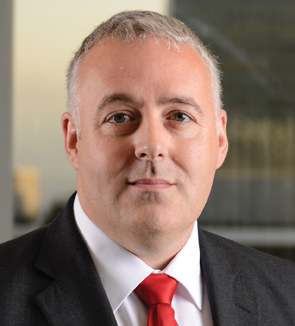A crucial word for security management – value – was chewed over this afternoon in the latest OSPAs thought leadership webinar, by a trio of speakers. They were two from the UK – long-time retail security man Gary Parkes, now Group Profit Protection Manager at clothing and homeware retail chain Matalan; and Paul Harvey, pictured, CSyP, of guarding firm Ward Security – and one from Nigeria; the former Nigerian Army man Samuel Agbanusi, for the last ten years Security Manager at Union Bank of Nigeria.
Prof Martin Gill the OSPAs founder and chair of the webinars, posed the opening question – is security central, or marginal to core business activity? On the one hand security staff and departments have protected empty buildings and infrastructure during lockdown; on the other hand, other functions may claim that they too have been important during the pandemic – and come austerity, security will be the first to be cut, anyway. As Martin said after the three speakers laid out their ideas, security value on the front line is ‘a real biggie for the whole sector’. Does security make such a good value proposition for a business? How to measure value?
That was acknowledged by Gary Parkes; that a sales manager can point to sales of x amount of units per day, but a security guard does not necessarily know who or what he has prevented coming into a store. If a guard is standing at a door, and is checking people for wearing of face masks or use of hand sanitiser; the question will be asked, why can’t that be done by a general member of staff, ‘and that’s a valid point’. We have to move away from the man or woman on a door purely to stop people from coming in. Security should be about enhancing the role, and offering service; difficult to quantify, he admitted.
Martin Gill put the same point to Paul Harvey as a security supplier. Paul saw a change in the way that an asset is valued – satisfied tenants renew, which is good for the owner. If you create a sense of community, the value of the asset is higher; and such a sense of community is provided from front of house and security and other staff. Security is also a bit of an insurance policy, he went on, in the event of a major incident – while perhaps an unwritten aspect of security, a client will want to know what his contracted security can do, if things go wrong.
Should there be another lockdown, we will rely on security personnel to see us through and protect our assets, he said. “We have worked incredibly hard during the national crisis.”
Martin recalled recent work with ex-offenders, whereby he is paid by a retailer to go shoplifting – put another way, to look for weaknesses in retail loss prevention. A good security officer, Martin said, is a major impediment to shop theft; but still the world doesn’t really recognise that the face of the industry, the store security officer, contributes value.
Gary Parkes as an end user of guarding, like Paul Harvey earlier, acknowledged the long-time ‘race to the bottom’ in contract guard services. Paul though spoke of seeing end user expectations and demands – whether in offices, the public realm, or mixed-use schemes – as ‘absolutely driving a different type of buying behaviour’, significantly different to ten years ago, he said. Expectations of customer service generally are much higher, he added.
Martin Gill brought up another crucial idea to the standing and indeed very existence of security positions and departments – whether security is or can be regarded as ‘core’ – a co-ordinating department of related services such as business continuity and health and safety, whose own professionals may argue for their function to be such a core.
Gary Parkes replied that at Matalan (as at some other retailers) it’s difficult to separate health and safety from security; earlier, he spoke of auditors from his department doing data mining and other checks for security and non-security uses alike for the retail chain. Essentially, Gary said, those key functions should be working together.
Martin said: ‘But who should be in charge, Gary?’
The best manager, Gary replied.
Earlier, Samuel Agbanusi spoke of security as everybody’s business and responsibility – ‘you see something, you say something’ – and described the place of security at his bank, which has some 300 branches in Nigeria – not only for staff and customers, but for everyone involved in the bank’s business. He stressed security as key and core to any business, including financial institutions.
Paul Harvey said that security guarding suppliers have been bad at saying no (no, that is, to work offered, even if they are not well placed to provide the service or serve a location). He said: “I understand it is a fiercely competitive marketplace, but I do think with the change of requirement, what the buyers and users are looking for, [security guarding] people are actually becoming more specialist and being prepared to say no and give themselves a better opportunity to be successful.” He concluded the webinar by suggesting that the biggest barrier for the security industry to overcome is the ‘fragmentation of the message’. Lots of groups want to be the ‘voice of the industry’, so that industry is not particularly joined up. It needs to work towards one key theme, he added.
Other webinars
OSPAs webinars usually run on Tuesdays and Thursdays. The next, on Tuesday, October 20, is titled; ‘What is in a name: security officer or security guard?’. You can sign up to watch it for free, and view past webinars, at https://theospas.com/thought-leadership-webinars/.










